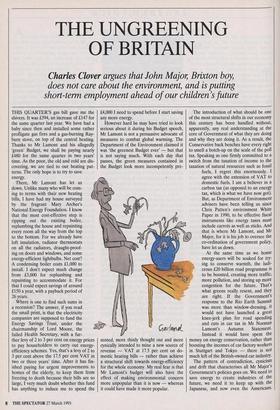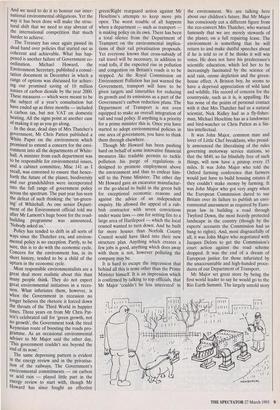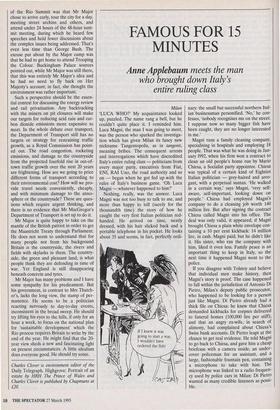THE UNGREENING OF BRITAIN
Charles Clover argues that John Major; Brixton boy,
does not care about the environment, and is putting short-term employment ahead of our children's future
THIS QUARTER'S gas bill gave me the shivers. It was £394, an increase of £147 for the same quarter last year. We have had a baby since then and installed some rather profligate gas fires and a gas-burning Ray- burn stove, on top of the central heating. Thanks to Mr Lamont and his allegedly 'green' Budget, we shall be paying nearly £480 for the same quarter in two years' time. As the poor, the old and cold are dis- covering, we are tied to our heating pat- terns. The only hope is to try to save energy.
There, Mr Lamont has let us down. Unlike many who will be com- ing to terms with their new heating bills, I have had my house surveyed by the fragrant Mary Archer's National Energy Foundation. I know that the most cost-effective step is ripping out the existing boiler, replumbing the house and repainting every room all the way from the top to the bottom. For we already have loft insulation, radiator thermostats on all the radiators, draught-proof- ing on doors and windows, and some energy-efficient lightbulbs. Net cost? A condensing boiler costs £1,000 to install. I don't expect much change from £3,000 for replumbing and repainting to accommodate it. For that I could expect savings of around £150 a year, with a payback period of 26 years.
Where is one to find such sums in a recession? The answer, if you read the small print, is that the electricity companies are supposed to fund the Energy Savings Trust, under the chairmanship of Lord Moore, the failed Health Secretary, with a fur- ther levy of 2 to 3 per cent on energy prices to pay householders to carry out energy- efficiency schemes. Yes, that's a levy of 2 to 3 per cent above the 17.5 per cent VAT in two or three years' time. After it has fin- ished paying for urgent improvements to homes of the elderly, to keep them from freezing to death because their bills are so large, I very much doubt whether this fund has anything to induce me to spend the £4,000 I need to spend before I start saving any more energy.
However hard he may have tried to look serious about it during his Budget speech, Mr Lamont is not a persuasive advocate of measures to combat global warming. The Department of the Environment claimed it was 'the greenest Budget ever' — but that is not saying much. With each day that passes, the green measures contained in the Budget look more incompetently pre- sented, more thinly thought out and more cynically intended to mine a new source of revenue — VAT at 17.5 per cent on do- mestic heating bills — rather than achieve a structural shift towards energy-efficiency for the whole economy. My real fear is that Mr Lamont's budget will also have the effect of making environmental concern more unpopular than it is now — whereas it could have made it more popular. The introduction of what should be one of the most structural shifts in our economy this century has been handled without, apparently, any real understanding at the core of Government of what they are doing and why they are doing it. As a result, the Conservative back benches have every right to smell a botch-up on the scale of the poll tax. Speaking as one firmly committed to a switch from the taxation of income to the taxation of natural resources such as fossil fuels, I regret this enormously. I agree with the extension of VAT to domestic fuels. I am a believer in a carbon tax (as opposed to an energy tax, which is what we have now got). But, as Department of Environment advisers have been telling us since Chris Patten's environment White Paper in 1990, to be effective fiscal instruments like energy taxes must include carrots as well as sticks. And that is where Mr Lamont, and Mr Major, for it is his job to oversee the co-ordination of government policy, have let us down.
At the same time as we home energy-users will be soaked for try- ing to conserve warmth, the ludi- crous £20 billion road programme is to be boosted, creating more traffic, more pollution, and storing up more congestion for the future. That's what greens really resent, and they are right. If the Government's response to the Rio Earth Summit was more than window-dressing, it would not have launched a great knee-jerk plan for road spending and cuts in car tax in Mr Norman Lamont's Autumn Statement. Instead it would have spent the money on energy conservation, rather than boosting the incomes of car factory workers in Stuttgart and Tokyo — there is not much left of the British-owned car industry.
The pattern of contradiction, cynicism and drift that characterises all Mr Major's Government's policies goes on. We need to save energy to create industries of the future, we need it to keep up with the Japanese, and now even the Americans. And we need to do it to honour our inter- national environmental obligations. Yet the way it has been done will make the struc- tural shift that we need to stay abreast of the international competition that much harder to achieve.
The Treasury has once again passed its dead hand over policies that started out as coherent and achievable. What has hap- pened is another failure of Government co- ordination. Michael Howard, the Environment Secretary, published a consul- tation document in December in which a range of options was discussed for achiev- ing our promised saving of 10 million tonnes of carbon dioxide by the year 2000. These measures — which were meant to be the subject of a year's consultation but have ended up as three months — included a carbon tax, but not VAT on domestic heating. All the signs point at another case of making it up as you go along.
In the dear, dead days of Mrs Thatcher's government, Mr Chris Patten published a White Paper on the environment which promised to extend a concern for the envi- ronment into all the departments of White- hall. A minister from each department was to be responsible for environmental issues, and a cabinet committee, Misc 141 as I recall, was convened to ensure that hence- forth the future of the planet, biodiversity and our grandchildren were incorporated into the full range of government policy across the spectrum. The past year has seen the defeat of such thinking: the `un-green- ing' of Whitehall. As one senior Depart- ment of the Environment official told me after Mr Lamont's huge boost for the road- building programme was announced, 'Nobody asked us.'
Policy has tended to drift in all sorts of ways since the Thatcher era, and environ- mental policy is no exception. Partly, to be sure, this is to do with the economic cycle. Concern for the environment has, in its short history, tended to be a child of the Upturn in the economic cycle.
Most responsible environmentalists are a great deal more realistic about this than many people think. They do not expect great environmental initiatives in a reces- sion. What infuriates them, however, is When the Government in recession no longer believes the rhetoric it forced down the throats of the Third World in happier times. Three years on from Mr Chris Pat- ten's celebrated call for 'green growth, not no growth', the Government took the tired Keynesian route of boosting the roads pro- gramme. As an occasional environmental adviser to Mr Major said the other day, This government couldn't see beyond the end of its nose.'
The same depressing pattern is evident in the energy review and in the privatisa- tion of the railways. The Government's environmental commitments — on carbon or acid rain — played little part in the energy review to start with, though Mr Howard has since fought an effective green/Right rearguard action against Mr Heseltine's attempts to keep more pits open. The worst trouble of all happens when a department — such as transport — is making policy on its own. There has been a total silence from the Department of Transport on the environmental implica- tions of their rail privatisation proposals. Yet everyone knows that cross-subsidy of rail travel will be necessary, in addition to road tolls, if the expected rise in pollution and congestion on Britain's roads is to be stopped. As the Royal Commission on Environment Pollution has just warned the Government, transport will have to be given targets and timetables for reducing its growth and its emissions as a part of the Government's carbon reduction plans. The Department of Transport is not even equipped to make an overall integration of rail and road policy. If anything is a priority for a prime minister this is. Once you have started to adopt environmental policies in one area of government, you have to think them through elsewhere.
Though Mr Howard has been pushing hard on behalf of some innovative financial measures like tradable permits to tackle pollution his purge of regulations is designed to promote employment above the environment and thus to endear him- self to the Prime Minister. The other day Mr Howard gave an excavator manufactur- er the go-ahead to build in the green belt for exceptional economic reasons and against the advice of an independent enquiry. He allowed the appeal of a rub- bish contractor with seven convictions under waste laws — one for setting fire to a large area of Hartlepool — which the local council wanted to turn down. And he built far more houses than Norfolk County Council would have liked into their new structure plan. Anything which creates a few jobs is good, anything which does away with them is not, however polluting the company may be. It is hard to escape the impression that behind all this is none other than the Prime Minister himself. It is an impression which is confirmed by talking to top officials, that Mr Major 'couldn't be less interested' in the environment. We are talking here about our children's future. But Mr Major has consciously cut a different figure from the eco-convert Mrs Thatcher, who warned famously that we are merely stewards of the planet, on a full repairing lease. The environment is something that he will return to and make dutiful speeches about if he is told to or if he thinks it will win votes. He does not have his predecessor's scientific education, which led her to be increasingly fascinated by the science of acid rain, ozone depletion and the green- house effect. A Brixton boy, he seems to have a deprived appreciation of wild land and wildlife. His record of concern for the countryside, such as it is, is appalling. He has none of the points of personal contact with it that Mrs Thatcher had as a natural scientist, Nick Ridley had as a fly-fisher- man, Michael Heseltine has as a landowner and bird-watcher or Chris Patten as a Six- ties intellectual.
It was John Major, common man and lover of Little Chef breakfasts, who proud- ly announced the liberalising of the rules governing motorway service stations, so that the M40, so far blissfully free of such things, will now have a pitstop every 15 miles. It was John Major who told the Oxford farming conference that farmers would just have to build housing estates if they couldn't make money by farming. It was John Major who got very angry when the European Commission dared to sue Britain over its failure to publish an envi- ronmental assessment as required by Euro- pean law in building a road through Twyford Down, the most heavily protected landscape in the country (though by the experts' accounts the Commission had us bang to rights). And, most disgracefully of all, it was John Major who negotiated with Jacques Delors to get the Commission's court action against the road scheme dropped. It was the end of a dream of European justice for those infuriated by the unaccountable and high-handed proce- dures of our Department of Transport.
Mr Major set great store by being the first world leader to say he would go to the Rio Earth Summit. The largely untold story of the Rio Summit was that Mr Major chose to arrive early, tour the city for a day, meeting street urchins and others, and attend under 24 hours of the 48-hour sum- mit meeting, during which he heard few speeches and held fewer discussions about the complex issues being addressed. That's even less time than George Bush. The excuse put about by the Major camp was that he had to get home to attend Trooping the Colour. Buckingham Palace sources pointed out, while Mr Major was still there, that this was entirely Mr Major's idea and he had no need to fly back on Her Majesty's account; in fact, she thought the environment was rather important.
Such a perspective should be the essen- tial context for discussing the energy review and rail privatisation. Any backtracking with the miners on pit closures will make our targets for reducing acid rain and car- bon dioxide emissions more expensive to meet. In the whole debate over transport, the Department of Transport still has no targets or strategy for restraining traffic growth, as a Royal Commission has point- ed out. The road congestion, rocketing emissions, and damage to the countryside from the projected fourfold rise in out-of- town traffic growth over the next 20 years are frightening. How are we going to price different forms of transport according to their environmental cost? How will we pro- vide travel needs conveniently, cheaply, and with minimum damage to the atmo- sphere or the countryside? These are ques- tions which require urgent thinking, and there is no evidence that Mr MacGregor's Department of Transport is set up to do it.
Mr Major is quite happy to take on the mantle of the British patriot in order to get the Maastricht Treaty through Parliament. He does not seem to understand that for many people not from his background Britain is the countryside, the rivers and fields with skylarks in them. The country- side, the green and pleasant land, is what people think they are defending in time of war. Yet England is still disappearing beneath concrete and tyres.
Mr Major has many problems and' I have some sympathy for his predicament. But his government, in contrast to Mrs Thatch- er's, lacks the long view, the stamp of per- manence. He seems to be a politician reacting nervously to day-to-day events, inconsistent in the broad sweep. He should try lifting his eyes to the hills, if only for an hour a week, to focus on the national plan for 'sustainable development' which the Rio process requires Britain to write by the end of the year. He might find that the 20- year view sheds a new and fascinating light on present circumstances. A little idealism does everyone good. He should try some.
Charles Clover is environment editor of the Daily Telegraph. Highgrove: Portrait of an estate by HRH The Prince of Wales and Charles Clover is published by Chapmans at £20.




























































 Previous page
Previous page